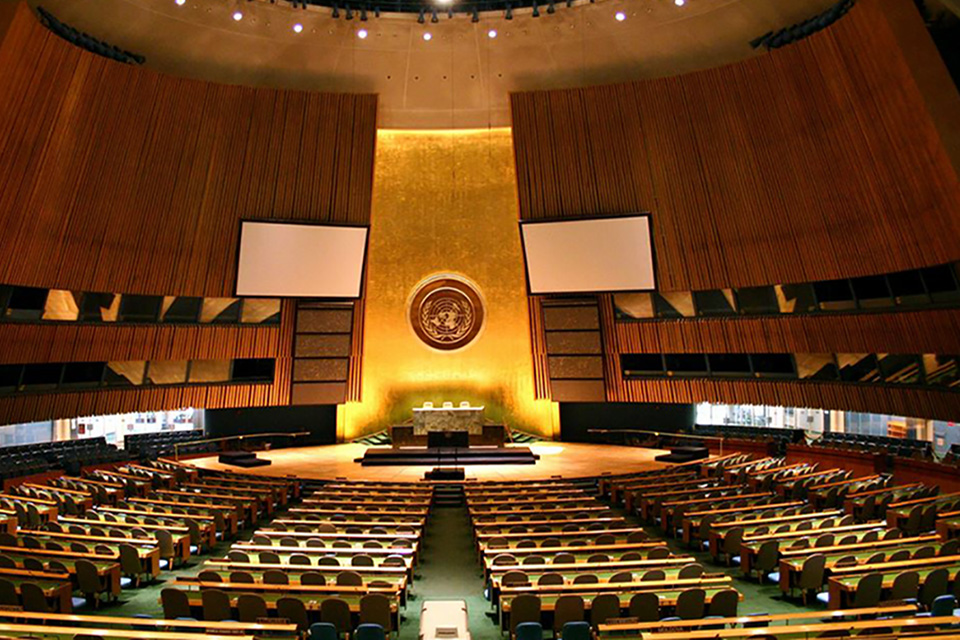Urgent need for renewed negotiations to help end the Palestinian-Israeli conflict
Statement by Ambassador Karen Pierce, UK Permanent Representative to the UN, at the Security Council Open Debate on the Middle East and the peace process.

Thank you very much indeed Mr President, and thank you to the Special Representative for his briefing, and to the two other speakers.
I think it’s obvious, Mr President, that the ongoing violence on Gaza’s borders have made the past weeks especially challenging for all those of us who are committed to pursuing a revived Middle East Peace Process. For the United Kingdom, we are deeply concerned by the recent increase in violence and by the resulting high number of Palestinians killed and injured. And we would continue to strongly urge Israel to show restraint in their response to the protest, but for all actors to abide by their obligations under international law. And in particular, along with Ambassador Haley, we reiterate the importance of protecting minors.
That said, it is crystal clear that Hamas and their operatives have been exploiting these protests for their own benefit. Israel has the right to secure itself against Hamas and other terrorist groups.
Given the importance of accountability, we are supportive of an independent and transparent investigation. We therefore welcome Israel’s commitment to investigate the conduct of operations. We would urge that its findings be made public and if wrongdoing is found, that those responsible be held to account.
The immediate concern, Mr President, has to be preventing further violence. We urge all parties to show maximum restraint and to do whatever they can to prevent further escalation and the loss of life. In particular, we urge Israelis to reconsider the use of live fire, and we urge the Palestinian leadership to maintain their calls for non-violent protests. Palestinians have a fundamental right to protest peacefully, but those with influence over Hamas must make clear that the use of violence and aggressive tactics is unacceptable and it will do nothing to further the Palestinian cause.
The violence has sadly put added strain on the already dire humanitarian situation in Gaza. This is particularly true of the health sector and this was already operating far beyond capacity. The parties, Mr President, need to do all they can to address the underlying causes of the dire economic and humanitarian situation. We look to Israel to lift its movement and access restrictions on people and goods including urgently granting medical permits. While we welcome last week’s short reopening of the Rafah crossing, we urge Egypt to open it on a more permanent basis in order to ease the suffering of ordinary citizens in Gaza. And Hamas needs to decide whether it is prepared to work for the good of the Gazan people and join efforts in peace, or whether it will continue to use terror and neglect the basic needs of Gaza’s population.
The international community has an important role to play in improving the humanitarian situation, and this includes the continued support to UNRWA, as this provides essential services to some of the most vulnerable Palestinian refugees.
The situation in Gaza could, we believe, be radically improved through the return of the Palestinian Authority. The United Kingdom remains strongly supportive of a Hamas Fatah reconciliation and this would see the PA resuming government functions in Gaza and restoring effective and accountable governance. We welcome Egypt’s facilitation role and would like to encourage them to help the parties discuss the most difficult issues, such as security.
The Special Coordinator, Mr Mladenov, has shown outstanding leadership on both reconciliation and on progressing access and projects to improve the situation in Gaza. And as ever, Mr President, I’d like to reiterate that the United Kingdom stands ready to assist him.
Like many worthwhile things, the process towards peace requires much patience. But we know from history that violence will not help us to achieve this ultimate goal and the conflict will only be resolved through a political process to a two-state solution. There is an urgent need for renewed negotiations that can end the Palestinian-Israeli conflict and deliver peace and safe, secure and sovereign homes for both Palestinians and for Israelis and the United Kingdom again will be committed to doing all we can to support that goal.
Mr President,
The Israeli-Palestinian conflict cannot be seen in isolation from the many other conflicts in the Middle East. Israel’s security, let alone her existence, should not be put at risk by any UN member state. The missile build-up in Syria and elsewhere offers the clear risk of escalation, and a slide in to further violence in Israel and the occupied territories would have a significant detrimental effect on stability in the wider region. I would like to take this opportunity, Mr President, to recall since the JCPOA agreement has been mentioned by the Israeli Ambassador, I would like to recall that the United Kingdom’s position on that agreement is clear and remains clear. We believe it is a crucial agreement that makes the world safer and contributes to regional and global security by neutralizing the threat of a nuclear armed Iran. And we engage all partners as we take discussions on the JCPOA forward.
Thank you Mr President.